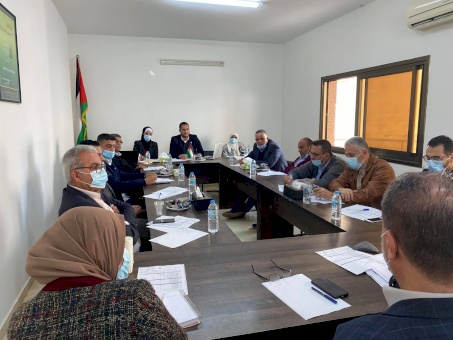
In a hearing organized by AMAN on licensing criteria of oil and Gaza companies
Government bodies and stakeholders in Gaza: efforts must be united to apply and disseminate safety measures effective in the West Bank
Gaza – The Coalition for Integrity and Accountability-AMAN held a hearing on rigorous licensing criteria applicable to oil and gas companies, covering also the stricter oversight and inspection measures launched following the Nuseirat fire that claimed tens of lives in the Camp. The purpose of the meeting was to promote integrity and reinforce procedures while participants agreed to standardize safety measures similar to what is applicable in the West Bank for citizens’ public safety.
Findings of investigation and oversight and licensing terms remain unpublished!
AMAN Coalition also contacted the investigation committees formed following the sorrowful accident since they have not yet published the findings of the technical investigation. It also monitored the subsequent formation of technical subcommittees, which – in turn – imposed severer oversight and licensing measures to fuel and gas companies. Due to non-publication of the measures, companies’ owners filed complaints that spanned a whole year following denial of renewal of their licenses. This situation resulted in a crisis that triggered engagement of government bodies and stakeholders around the same table to discuss each party’s obligations while ensuring integrity and compliance. The purpose is to protect citizens’ safety, which should come as the utmost important priority.
Efforts need to unite to apply and disseminate the safety measures applicable in the West Bank and Gaza Strip
Participants reached a major recommendation: unite efforts to apply safety measures effective in the West Bank. The same system shall be adopted and all parties must comply, including companies, to serve the public interest. Official and government bodies need to publish the compulsory standards and procedures, especially as relates to public procurement, tendering and award of bids in order to prevent any suspicion of conflict of interest between companies’ technical interests and governmental bodies’ interests.
The Palestinian Standardization Institute needs to play a stronger role in monitoring fuel reservoirs and tanks
AMAN Coalition also called for a stronger PSI role in monitoring fuel reservoirs and tanks. It also invited stakeholders to distribute roles in a more complementary manner among the Civil Defense, Ministry of Transport, Ministry of Local Government, and the Petroleum Authority. It highlighted the importance of disclosure of safety and security measures required from different stakeholders based on legal provisions. It additionally called for clear regulations of inspection, seizure, investigation, penalties and violations related to civil defense works. It underscored disclosure of these measures and regulations to the public and all stakeholders.
Weak oversight due to multiple regulations and systems
The Minister of Local Government explained that the main problem is weak oversight because of multiplicity of laws and regulations, which contradict with each other not to mention deviations in their implementation. He underlined the necessity to unify legal references of safety and security measures. He further confirmed that MoLG does not charge any fees or lump sums from companies on the inspections it performs.
The Civil Defense stressed on compliance with the law as the shortcut to ensuring citizens’ safety. It explained that companies do not conform to Palestinian Standard 157 of January 1997, noting it is in force in the West Bank.
Petroleum Directorate General at the Petroleum Authority stressed on the rigorous implementation of licensing procedures and inspection of gas and oil tanks. It considered the situation before this date a violation of public affairs that jeopardized citizens’ life. The Petroleum Authority explained how difficult it is to conduct full testing of the tanks in the Gaza Strip since most these tanks are weak. If tests are thoroughly conducted around 70-80% will be put out of business. Furthermore, there isn’t any government body capable of conducting the minimum testing and inspections to ensure safety. The same Authority mentioned that the technical committee adopted 24 out of 56 standards.
On their part, the Association of Petroleum Companies Owners stressed that the stakeholders are not against any safety measures because they actually abide by these measures. They claim their right to licenses to resume their work while oversight and inspection procedures can continue afterwards. They explained they endured huge losses, mostly the sums estimated for the tests and inspections. The Association also explained that the findings of the committee did not lead to any technical recommendations to improve the quality of their tanks.
AMAN shall follow up on this meeting’s recommendations to ensure they are applied in a manner that bridges the gap among the parties. It reiterated the need to comply with the values of transparency and integrity in addition to the necessity to publish the procedures imposed.
